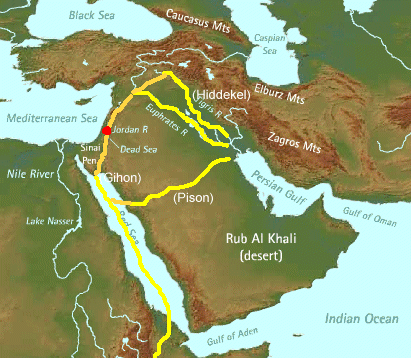Prophet Haggai Silent about Zechariah - and vice versa
by
Damien F. Mackey
“… Haggai and Zechariah, who according to
Ezra 5:1; 6:14 both participated in the reconstruction of the Second Temple.
The date formulae in Haggai and Zechariah clarify that
the prophets were active in Yehud within
approximately the same months of the second year of Darius … though in their
extant writings they never refer to each other”.
Typically, the prophet Haggai is presented
here as an individual distinct from Zechariah. However, according to my recent
article:
Complete Jeremiah
the great prophet Jeremiah, having returned from Egypt, and now an old man in the
Medo-Persian era, is to be multi-identified
with:
- Haggai, his name perhaps being a hypocoristicon of
- Habbakuk, a foreign (Akkadian) name, which I have taken to be the name given Jeremiah by the Chaldeans, and with
- Zechariah.
These three identifications for Jeremiah are
linked according to what we read in this article: “This title (han-nâbî) is applied only to Habakkuk, Haggai, and Zechariah”.
Dalit
Rom-Shiloni, pondering in his article “Ezekiel
and Jeremiah: What Might Stand Behind the Silence?, that is, why the
prophet Ezekiel never mentions his contemporary Jeremiah, has thought to
explain this apparent oddity using the case of Haggai and Zechariah (pp.
204-205) http://humanities1.tau.ac.il/segel/dromshil/files/2012/10/Rom-Shiloni.HeBAI-2-2012203-30.pdf
At face value, there would seem to
be no problem with the silence maintained between the two prophets. Throughout
the prophetic literature, the extremely individualistic nature of the prophetic
role seems to work against explicit communication between prophets. To
illustrate this wellknown phenomenon, suffice it to mention Haggai and Zechariah,
who according to Ezra 5:1; 6:14 both participated in the reconstruction of the
Second Temple. The date formulae in
Haggai and Zechariah clarify that the prophets were active in Yehud within
approximately the same months of the second year of Darius (520 B.C.E.), though
in their extant writings they never refer to each other.2
There is another way in which
looking at Haggai and Zechariah may shed light on Jeremiah and Ezekiel. Haggai,
and even more so Zechariah, have long been acknowledged as relying on “the
former prophets” (Zech1:4; 7:12). Although they do not name those to whom they
refer, they each allude to specific prophecies (mainly those of Jeremiah,
Ezekiel, and Deutero-Isaiah), or utilize in their own prophecies prophetic
patterns and genres found in these predecessors.3 Furthermore, this allusive
character of both Haggai’s and Zechariah’s prophetic writing is not restricted
to isolated
prophetic traditions; they also
appear to bring together multiple texts from diverse sources within biblical literature.4
This allusive usage of biblical literature formulates theological and
ideological deliberations between each of the prophets and their
contemporaries. The option of a shared discourse by the early six century in
both Jerusalem and Babylon is intriguing. Accordingly, might intertextual
literary relationships between Ezekiel and Jeremiah (and other textual
references they evoke in general) be the keys to revealing possible connections
between the prophets and their followers?
[End of quote]
Whilst
establishing the relationship between Ezekiel and Jeremiah is a separate issue,
for later consideration, the reason why there is no explicit interchange
between Haggai and Zechariah is because, in my opinion, only the one prophet is actually involved here.

Comments